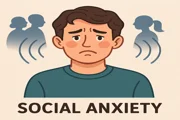

If you've never heard the term social phobia, it refers to the intense fear experienced by a person when placed in specific situations. For example, presenting a thesis in front of an audience or speaking to a committee can provoke significant personal anxiety. The social context requiring interaction with others triggers this discomfort.
For instance, someone suffering from social phobia might feel intense nervousness before giving a presentation, even if they are well-prepared. Their mind may race with thoughts of failure, and physical symptoms such as trembling hands or a shaky voice may make the experience feel unbearable.
This fear is not merely shyness or stage fright. It goes beyond typical nervousness, becoming a persistent condition that interferes with daily activities and life goals.
In mild cases, the individual may only avoid speaking in meetings, but in severe cases, they may isolate themselves entirely, turning down job opportunities or social invitations to avoid discomfort.
It's important to understand that the fear of being judged can stem from deeper cognitive patterns. People with social phobia often have an internal dialogue filled with self-criticism and catastrophic thinking.
For example, they might believe that a single awkward pause during a conversation will ruin others’ opinion of them, or that sweating in public makes them appear weak or incompetent.
Fortunately, with appropriate support and therapeutic intervention, many individuals can manage their symptoms effectively. They can learn to reframe negative thoughts, reduce self-consciousness, and engage more confidently with others.
It’s also helpful to build a support system. Friends, family, and colleagues who understand the condition can offer encouragement and gently help the individual confront social situations at their own pace.
In recent years, online therapy and virtual exposure exercises have become popular tools in the treatment of social anxiety, offering accessible and flexible approaches to recovery.
What defines this specific disorder? The core issue is the fear of being judged by others. When performing tasks like presenting a project, defending a thesis, or delivering a speech, the individual may feel strong emotional and psychological distress. The main discomfort stems from fear of criticism or receiving a negative evaluation.
This condition is characterized by two main aspects:
Humans are inherently social beings. Most strive to build positive, relaxed relationships—whether with family, at school, at work, during leisure activities, or in romantic contexts. A certain level of anxiety in social situations is entirely normal.
However, for individuals with social anxiety, the intensity of fear leads them to avoid social situations that could trigger it. If forced to engage, they experience extreme discomfort.
Social anxiety can appear in two main forms:
Statistically, at least 10% of people experience social phobia at some point. It tends to affect men more frequently.
Diagnosis requires certain criteria:
Common symptoms include:
Situations that may trigger symptoms include:
These events may lead to fears such as:
As a result, individuals may:
Just thinking about these scenarios can cause elevated anxiety levels. To avoid discomfort, sufferers may withdraw socially, which can lead to further problems like depression or anger.
Without intervention, social phobia tends to become chronic. Cognitive-behavioral therapy is the most effective approach, focusing on:
The goal is to help the person gradually face and overcome feared situations. Medication (anxiolytics or antidepressants) may also be used in more severe cases.

← Also read: Selective Mutism – symptoms, causes and treatment
For additional details, see the Wikipedia page on social anxiety disorder.
Social phobia involves intense fear and avoidance that disrupt daily functioning, unlike typical shyness which is manageable and short-lived.
Yes, it can lead to rapid heartbeat, excessive sweating, muscle tension, nausea, and difficulty speaking—especially during social interactions.
They fear being negatively judged, embarrassed, or rejected, which leads to avoidance of public speaking, meetings, or even casual gatherings.
Absolutely. CBT helps reframe negative thoughts, reduce avoidance behaviors, and build confidence through gradual exposure and skills training.
It often becomes chronic, limiting career opportunities, relationships, and overall wellbeing. In severe cases, it may lead to depression or isolation.